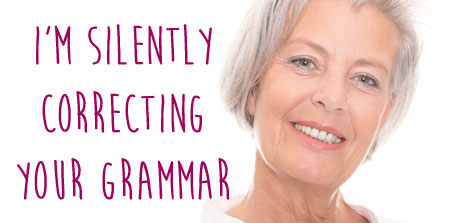Is good grammar a thing of the past, something the younger generations have been chipping away at gradually with text speak and auto-correct? Author and grammar expert Caroline Taggart isn't quite ready to blame our grammar failings on the youngsters...
Caroline Taggart
Is our language going to the dogs?
Posted on: Thu 27-Oct-16 17:55:03
(125 comments )
Whenever I do talks or radio phone-ins about grammar, usage and language generally, I'm struck by the number of people of my generation (let's say 50+, though I have to admit to 50++) who think that English is falling apart, that the young are ignorant and illiterate and that recent changes – particularly those brought about by texting and social media – are to be deplored.
I'm always slightly saddened by this, because it feels like part of the 'any change is for the worse' mentality that too often characterises advancing years. That said, I can be as guilty as anyone: years ago I had to supervise two young graduates working on a publishing project. They were bright, willing and articulate, but their spelling was atrocious and I found myself saying, 'If you kids had done Latin…' Good grief, I thought. I’m 35 and already I'm turning into my mother.
But hey. I write books about English, so of course I'm a bit of a pedant. I object to people writing should of instead of should have and using jargon such as firing on all cylinders (unless they are talking about a car) or the elephant in the room (unless there is one). I like precise language, too: when we have words that express different meanings – such as alternate and alternative, incredible and incredulous, moral and morale – losing those distinctions weakens the language.
The way we speak and write is as much a part of the way we present ourselves as the way we dress. Just as few of us would turn up for an interview or a formal dinner in torn-off jeans and a scruffy t-shirt, so we should tailor our language to the occasion.
It does matter, whatever the anti-pedantry brigade says. If ever I am on trial for my life, I hope that the jury will be disinterested rather than uninterested.
It matters. But it doesn't matter all the time. And there's the rub. In the pub with friends on a Friday night, we can get away with saying, 'Well, you know what I mean.' In a job interview or being introduced to sticklers of an older generation, we should try harder. The way we speak and write is as much a part of the way we present ourselves as the way we dress. Just as few of us would turn up for an interview or a formal dinner in torn-off jeans and a scruffy t-shirt, so we should tailor our language to the occasion. The important thing is to know the difference and be able to smarten ourselves up when it matters. IMHO.
That's an expression I find myself using more and more, as I become more dogmatic in my old age. It's short for 'in my humble opinion' and you use it – or at least I do – when the opinion you've just expressed isn't very humble at all. I like it because of a story a friend tells from the days when he was a magazine editor dealing with a particularly pompous contributor. The contributor ended a diatribe with this abbreviation, provoking the tart reply that the man had never had a HO in his L. My friend was well into his sixties at the time – don't tell me that we have nothing to learn from the young, and that there is no room for innovation in our language.
Caroline's book, Misadventures in the English Language, is published by Michael O'Mara and is available from Amazon.







